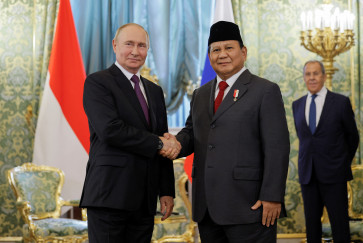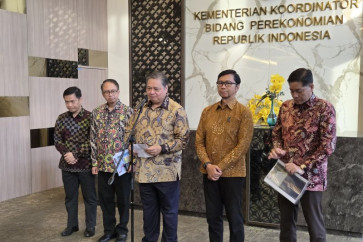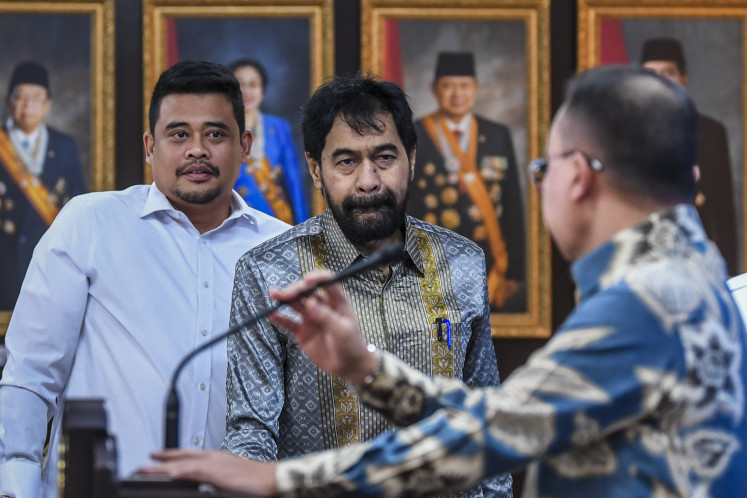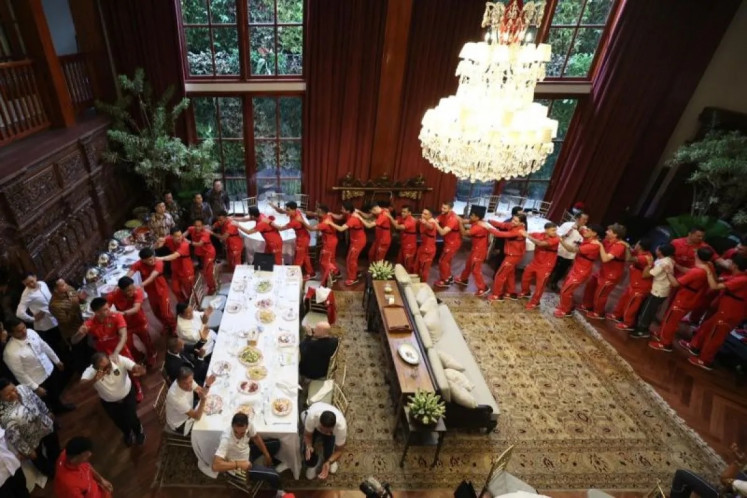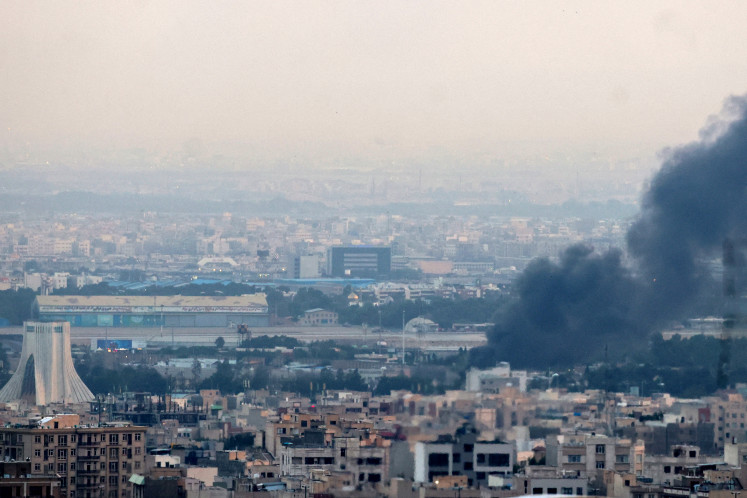Popular Reads
Top Results
Can't find what you're looking for?
View all search resultsPopular Reads
Top Results
Can't find what you're looking for?
View all search resultsWill the US maritime drone program matter to Indonesia?
The deep involvement of the US and the money it has poured into Maritime Security Board (Bakamla) could lead to an assumption, if not allegation, that the Indonesian institution is totally in the US’ pocket.
Change text size
Gift Premium Articles
to Anyone
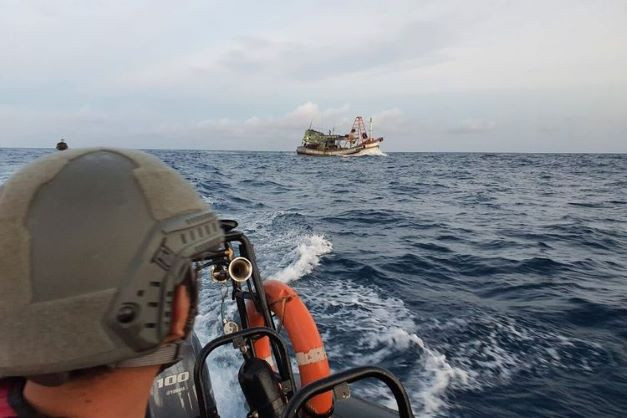

United States President Joe Biden is very apt at entertaining his counterparts’ desire for high-tech defense and security equipment. As reported by the media, in his bilateral meeting with President Joko “Jokowi” Widodo on the sidelines of recent Group of 20 Summit in Bali, Biden approved an initiative to support one of Indonesia’s maritime law enforcement agencies, the Maritime Security Board (Bakamla), with a maritime surveillance drone program.
The aid program will include procurement and maintenance of drones and pilot training.
The Biden administration expects the initiative to enable Bakamla to enhance its capabilities related to maritime domain awareness, maritime law enforcement and countering illegal fishing. The Coast Guard Capacity-Building program is one of a series of initiatives the Biden administration is willing to work together on with the Indonesian government.
The US embassy in Jakarta said that in the fiscal year 2022 alone, the US Department of State and the US Agency for International Development (USAID) were set to provide Indonesia with more than US$150 million in bilateral development and security assistance.
Previously, in 2020-2021, possibly under a different aid scheme, Bakamla received $3.5 million in a grant to construct a training center on Batam Island, near Singapore. Inaugurated in June of this year, the center is furnished with classrooms, barracks and a launch pad.
With all the aid Bakamla has obtained from the US so far, what can we conclude?
First, the deep involvement of the US and the money it has poured into the agency could lead to an assumption, if not allegation, that the Indonesian institution is totally in the US’ pocket. This indication is worth pondering because the US has been the most active country Bakamla has engaged with since its establishment in 2014, specifically under its last two heads.
Prior to the two aforementioned aid programs, the US brought scores of Bakamla personnel to America to participate in various short courses pertaining to maritime law enforcement. On the other hand, there are many other countries that are ready to support the Bakamla, but it is hard to see their program in the headlines if any. Japan is one of them.
When Bakamla was a coordinating board known as Bakorkamla from 2005 to 2014, Japan was an ardent counterpart. It even assigned a team of Japan International Cooperation Agency (JICA) experts on maritime security seconded by the Japan Coast Guard (JCG) to have an office there.
Port visits paid by JCG patrol vessels and joint exercises involving it and its Indonesian counterpart were regular features of relationship between Bakorkamla and JCG. Moreover, there was a program of patrol vessel transfer allotted from decommissioned assets from Japan to Bakorkamla. For an unknown reason, however, the relationship faded away.
Starting with the closure of the JICA mission office at Bakorkamla and the withdrawal of JICA experts to Tokyo, now the Indonesia-Japan maritime security connection is practically dormant.
France, India, Australia and other countries are also as earnest as the US in forging cooperation in the maritime security realm, yet opt to keep a low profile. It is interesting that Bakamla is seemingly reluctant to approach China in its programs, although the Asian giant would be more than happy to lend a helping hand.
As one of the Non-Alignment Movement initiators, Indonesia has no barrier whatsoever to partnering with Chinese maritime law enforcement agencies. But the fact that the two countries’ coast guard institutions do not have formal cooperation seems to reinforce the notion that Bakamla “is within the US pocket”.
Second, based on the initial program proposed by former head of Bakamla, Vice Adm. (ret.) Achmad Taufiqoerrachman, drones are not on the board’s shopping list. According to its organizational structure, it currently manages three maritime zones with headquarters in Batam, Ambon in Maluku and Manado in North Sulawesi. These offices are supported by 20 bases – both stationary and mobile – established across the archipelago. All of the facilities are equipped with electronic devices to read distress signals through global maritime distress safety systems (GMDSS) and ship identification information via the automatic identification system (AIS). Other vessel tracking systems are also in place.
Bakamla also operates two satellite ground stations in Bangka Belitung province and Bitung in North Sulawesi province to provide maritime aerial surveillance. There are plans to develop several similar facilities, but the program has been put on hold due to issues concerning procurement practices.
Bakamla also maintains scores of patrol boats for interception operations, the biggest of which being KN Tanjung Datu 1101, which is based in Batam.
Drones have been included in the system perhaps in part because of Bakamla head Vice Adm. Aan Kurnia’s intention to leave a legacy before completing his military service in July next year.
Considering Bakamla’s limited assets, drones are not appropriate for providing a clear picture of maritime domain awareness unless the agency is able and willing to share its imaging with other national maritime law enforcement agencies that possess more patrol vessels and an intensive network of bases across the country, like the Navy and Marine Police.
Consequently, in addition to the procurement of the unmanned aerial vehicles, Bakamla is expected to sit together with other institutions to formulate interorganizational procedures for drone operations for maritime surveillance.
Within Indonesia maritime security architecture, the idea is highly important and needs to be executed since the existing maritime law enforcement agencies have their own authorities and jurisdictions but, to a certain degree, overlap. The establishment of Bakamla is theoretically supposed to end the confusion, but its journey since then proves that the objective is not as important anymore.
According to a regulation issued in March 2022, Bakamla is now a coordinating body. This ends the silent rivalries among maritime security agencies that emerged as soon as Bakamla was activated in 2014. The situation worsened when a top executive of Bakamla claimed to the media that the agency would liquidate the Marine Police and the Transportation Ministry’s Sea and Coast Guard (KPLP) and integrate them under its aegis.
Now, the dust has settled and the drone program can hopefully act as an integrator for a more solid coordination among national maritime law enforcement agencies.
***
The writer is the director of the National Maritime Institute (NAMARIN), an independent maritime think tank.


